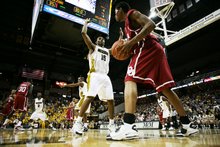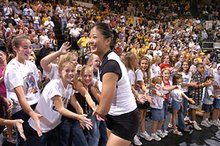When he’s wrong, he’s horribly, horribly wrong. But when he’s right, nobody nails it better.
I wanted to bring up a column he wrote in the KC Star today, in which he discusses the NBA’s ills and and their causes. He makes enough good points here that I want to address them one by one.
It’s going to take more than tweaking the playoff format to fix what is ailing the NBA.There’s no doubting that all of those things had an impact. There really were a lot of different factors conspiring against this year’s NBA Finals—the worst of all was probably the way the Spurs absolutely crushed Cleveland the first two games in SA. You just knew that, even if Cleveland picked off a game or two at home, there was absolutely no way they were winning on the road...and that kind of kills the motivation to watch. That’s my excuse, anyway.
The league that just 15 years ago thought it was on the cusp of catching the NFL in terms of U.S. and global relevance has now spiraled below baseball and could once again find itself a very distant third behind the NFL and MLB.
The just-completed NBA finals was the most-ignored championship series in the post-Magic-Larry-and-Michael era. The Spurs vs. the Cavaliers sparked little discussion, little drama and little television interest.
There are lots of theories about why this happened, including the one-sidedness of the series, the Spurs’ boring style of play, the weakness of the Cavaliers and the Eastern Conference, “The Sopranos” series finale, the overall number of cable viewing options. There is more than a kernel of truth in all of the theories.
Now’s as good a time as any, however, to mention something that quite a few columnists have caught onto by now: the Spurs aren’t boring anymore. Yes, they can beat you 79-77, but they can also beat you 109-107. Even if Tim Duncan is the most bland superstar in the history of the world, Tony Parker is amazing to watch, and Manu Ginobli makes for a phenomenal villain (seriously, with his flops and his amazing ability to make his body go completely limp at the first instance of contact, going down like he was shot on every other possession, he’s single-handedly—with help from guys like Andersen Varejao—turning basketball into soccer).
And as even more columnists have mentioned at this point, the Spurs have everything the typical “NBA is boring because it’s just 1-on-1, the teams don’t pass, and nobody plays defense” complainer should want to see. They move the ball amazingly well, they play the best defense in the league, and even though they have Tim Duncan, the Spurs’ world doesn’t just orbit around him (case in point: Tony Parker was Finals MVP).
Now, I hate the Spurs as much as anybody—I watched probably about a total of 48 minutes over the course of the four games—but I think this does illustrate a problem that might render the rest of Whitlock’s excellent column moot: TV watchers, and sports fans in particular, are fickle excuse-makers. I know—I count myself as one of them. And even if Whilock’s points below are addressed, I really don’t know how you counter this.
But I think there is a bigger truth that is not being widely discussed on a consistent basis.I don’t think the rank-and-file NBA players will suffer enough to make them sympathetic to the general public in any way—there’s no way the NBA’s financial situation gets that bad. To make people care, their salaries would have to dip to about $50K/year or worse...and that’s just not going to happen.
Basketball in the United States is in poor health. Our entire system needs to be overhauled to improve play and increase the passion of fans.
What has happened to American basketball is a prime example that freedom without vision is a dangerous thing. You can have too much freedom, and clearly the NBA is suffering the consequences of the freedom overload granted our players.
The good thing is that eventually the rank-and-file NBA players will begin to suffer financially, too. The current TV ratings are going to damage David Stern’s ability to negotiate the kind of TV contracts necessary to support the salaries of the average NBA player.
Yeah, LeBron James, Kobe Bryant and Tim Duncan will always get their money. The shoe companies will see to that. It’s the non-superstar — most of the league — who is going to get hurt, and that will force the NBA players association to work with Stern and the owners to fix basketball.
There are two major things, in my opinion, killing basketball right now: 1. AAU basketball; 2. early entry into the draft.And because the Spurs absolutely decimated them. And because everybody knew it was going to happen.
See, you can’t fix the NBA without first fixing college basketball. The players and David Stern must realize the healthier college basketball is the easier it will be for the NBA to regain its $ignificance.
Basketball fans are losing passion for the NBA because they haven’t been properly introduced to the league’s players.
LeBron James, allegedly, is a big star. He has a huge shoe contract. He’s featured in clever commercials. His face is recognized around the world. So why didn’t people tune in to see him play in the NBA finals?
Because basketball fans in Lawrence and Bloomington, Ind., and Durham, N.C., and all the other little basketball hotbeds don’t care about LeBron James. He didn’t play their game. Magic Johnson, Larry Bird and Michael Jordan built gigantic college followings and brought those passionate fans with them to the NBA.
Today’s players bring posses. The NBA players who visited a college campus for one or two years leave their disappointed fan bases behind.Durant and Oden are extreme outliers. I’m very curious what kind of impact the age limit will have on a year-to-year basis. It definitely can’t hurt, but I’m thinking that Michael Beasley at K-State and OJ Mayo at USC and Kevin Love at UCLA won’t make the same type of Oden/Durant-esque impact.
Many college basketball fans hate the NBA. They see the league as an institution that undermines the college game by stealing its underdeveloped players. There are people who want to see the NBA fail. That’s not good. It’s not healthy for basketball.
Rather than whining that an age limit is racist, NBA players need to understand that requiring players to go to college is good for the league and will put money in everyone’s pockets down the road.
This year’s NBA draft has created more excitement and more discussion than any NBA draft since Patrick Ewing came out of Georgetown. Why?
Because the Florida Gators — Corey Brewer, Joakim Noah and Al Horford — stayed in college and won back-to-back titles before jumping to the NBA. Because Greg Oden and Kevin Durant were forced to spend one year in college.
We’re actually familiar with many of the players who will be in this year’s draft. We’ve seen them play. We listened to Dick Vitale overhype them for five straight months. Durant and Olden will help drive TV ratings when they hit the league.
Without a doubt, though, the age limit was a fantastic idea. I do wish it had been in place when LeBron graduated high school—just for the fantasy of him attending Akron and taking them to a Final Four! (I realize that wouldn’t have happened, but it’s hindsight now, so I can say whatever I want.)
The NBA needs an age limit of 21 and/or a rule requiring three years of college participation.Wow, does this seem extreme to me. I wouldn’t complain if it happened, but a lot of people would. I’m fine with the current age limit, at least until we see how much of a year-to-year impact it will have.
The league and the players association also should work with the NCAA on doing something to eliminate AAU basketball. Our players are too raw and too difficult to coach because AAU basketball — and its undisciplined style of play — has become more important and influential than high school basketball.Aside from the 'eliminate' part (it's simply not going to happen), I agree.
I hate to keep using LeBron James as the example because I absolutely love his mental maturity and willingness to be coached, but he is an AAU player. AAU is the reason he doesn’t have a jump shot. AAU is the reason he’s so unskilled in the low post.I wish Whitlock would have focused more than three paragraphs on AAU. The NBA age limit is an easier topic to discuss, but AAU is where the heart of the problem lies. It’s a complete traveshamockery that LeBron has the weaknesses he has. Rick Barry ranted about LeBron’s weaknesses last week, and even though it smacked of curmudgeonry, he was basically right. LeBron has a horrid-looking jumpshot that really does look different with every shot, and he really doesn’t have a clue how to come off screens. And I’m worried that it’s too late to fix that. I mean, he made the conference finals despite such debilitating weaknesses—and he probably will again a few more times. Just think about what he could accomplish with just above-average skills from the 3-point line and the pick-and-roll and the low post. Wow.
AAU is the reason Carmelo Anthony is one of the worst teammates you could have. Yes, he got lucky and won a national championship in college. Trust me, it was luck. His game isn’t about winning. It’s about putting up numbers. He can’t see the floor and what his teammates are doing because that’s not necessary in AAU ball.
Anyway, the NBA — players, owners and Stern — should think big picture when trying to fix what ails the league.
But that shot and intuition should have evolved about 5-10 years ago. Instead, the AAU-centric high school (and junior high) system in which he grew and thrived spends more time propping up what you do have instead of addressing what you don’t.
Here’s the thing, though: I don’t have a damn clue how to fix this. AAU is big business now, and “eliminating” it isn’t even a 1% feasible option. So what is? I honestly don’t know. Thoughts?






|